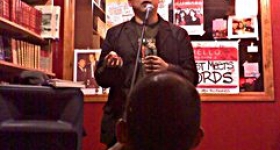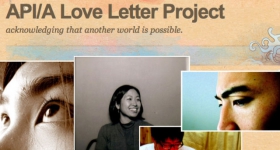I'm not that big into personal finance blogs, but I love Ramit Sethi's I Will Teach You To Be Rich. Last week he had a great post about the invisible scripts that guide our lives, and specifically, the invisible scripts embedded in him through Indian culture. The comments section is an enlightening look at red-blooded American ideals, but a few in there talk about the experience of coming up under two or more cultures (and some of the commenters don't live in America, which adds another great layer) and how these values sometimes stand in opposition to each other.
This got me thinking about the invisible scripts I grew up with, some uniquely Filipino values, and some values specific to the immigrant experience that affected my cousins and me and set us on our paths. Some were helpful, others not so much. Some scripts I came up with:
Nursing is the only way to guarantee success in America. This script, of course, is dictated by history. Our parents knew nursing as the easiest way to gain entry to the United States, and many of them believed it was the only job worth having and raised their kids accordingly. Interestingly, none of my aunts or uncles are nurses. My older cousins were heavily pressured into going into nursing after high school, but none of them finished the program. I understand how this field felt secure for my aunts and uncles, but I think it kept some of my older cousins off the right course for a long time. Fortunately, for us younger cousins, all of our aunts and uncles were considerably more supportive of our career interests than before. When I told my uncle that I was majoring in English, he said, "Well that's good; you can be a technical writer with that!"
You should be close to your family above all else. This wasn't necessarily espoused in my childhood home -- I'm an only child and my dad wanted little to do with his siblings back in the Philippines -- but it was the number one value in my cousins' home, and they were like my brothers, my aunt and uncle like my second set of parents. We took a lot of pride in having a big family, that there were always a thousand cousins around at Thanksgiving and Christmas, and we considered tiny families, or people who didn't hang out with their cousins, weird. There were a lot of good things about this growing up: my extended family helped establish traditions, and even though I was an only child, I wasn't necessarily lonely. But in my family, this idea mainly applies to people who stay close to home, and I'm still salty that none of my cousins were all that emotionally supportive of my decision to move in college, and that they're largely uninterested in visiting us in Cali.
There's no such thing as not working. The message was more particularly coming from my mom: Never depend on a man to support you; fairy tales are not real. My mom's version is what I consider the Fil-Am twist, since a lot of my friends in the burbs had moms who stayed at home. Truth is, nobody in my family has ever stayed at home to take care of the kids. Housewifery was unheard of. Everybody in my family -- from Connecticut to the Philippines -- brought home income. I am mostly thankful for this because it was the one thing that got me through going back to work after maternity leave. I think it also gave me a little more confidence to go to grad school and pursue other interests while being a mom than I would have if my mom were a housewife. Also, my mom was sending another important message about relationships as she was preparing herself to leave my father: stay in a marriage because you want to, not because you have no other options.
You have to be married to have children. No lie, the only thing my parents ever told me about making babies is that you had to be married to do it. I didn't even know what sex was or how it was done until I read Judy Blume's Forever in middle school. My mom was a bit smarter about it when I went to college and she was more open about birth control than my other aunts were with their daughters. Still, things happened the way they did and I had my daughter before I got married. And contrary to what my mom believed about children born out of wedlock, society did not shun me or my daughter and my now-husband and I turned out fine and in love. I am 100 percent happy with the choices I have made so far.
After college, you get a job no matter what, even if it's in a field you didn't study or don't like. This has always been interesting to me. Nobody in my family felt entitled to "take a year off" to travel the world and find themselves, and many thought that idea was absurd. On the other hand, grad school wasn't a smart or useful idea unless you were going to be a doctor. As a result, most of my cousins (and myself included) have gotten jobs in Big Insurance, the main industry in Connecticut. I think a little bit of time off and a little more encouragement to really figure ourselves out would've been beneficial to all of us, but on the upside, none of my cousins have really complained about being lost in terms of career.
All men are dogs and only want one thing. This was meant mainly for the girls in my family, and in CT, I had only one other girl cousin. You know how much this idea sucks? We weren't allowed to even befriend boys. We had to sneak around just to hang out with male friends. Aside from that, this idea gave my hetero male cousins a pass to respect women a little less and be more crude. As such, it took me a lot more time and trouble to 1) learn to sniff out somebody who was capable of being a respectful, trustworthy partner and 2) actually allow myself to trust him. I don't plan on teaching my daughter the same sweeping generalization about men.
There are many others, but these are the most prominent. What are some scripts embedded by your culture that you live by or have had to reject in adulthood?










Comments